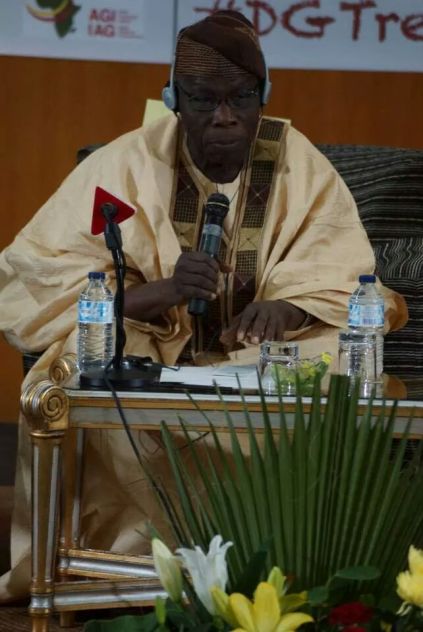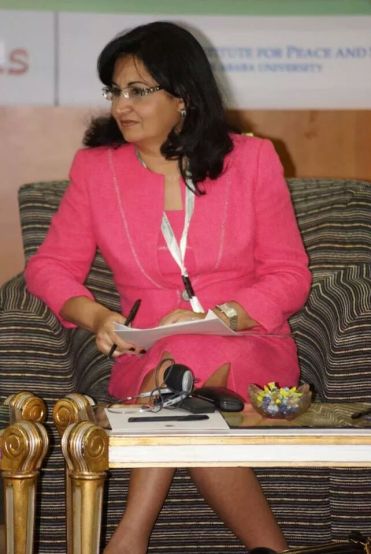
Africa has made considerable strides in striving towards democratic and participatory governance. Today, African leaders are convinced, more than ever before, that democratic governance and durable peace are a fundamental sine qua non for sustainable human development. All major Organization of African Unity (OAU)/African Union (AU) normative frameworks bear testimony to this firm conviction by African leaders including the 2000 Solemn Declaration on the Conference on Security, Stability, Development and Cooperation in Africa (CSSDCA), the 2000 Constitutive Act of the African Union and the 2007 African Charter on Democracy, Elections and Governance. The AU has undergone a paradigm shift from the old OAU doctrine of non-interference to the new doctrine of non-indifference to human rights abuses, mass atrocity and crimes against humanity within its Member States. However, while we have made tremendous progress, existential threats of democracy persist. This is the context within which the African Governance Architecture (AGA) was established.
The African Governance Architecture in a nutshell
The AGA is a direct by-product of the AU Shared Values Agenda. In February 2010, the 14th Ordinary Session of the AU Assembly endorsed a decision taken earlier by the Executive Council (EX.CL/Dec.525(XVI), recommending the theme of the 16th Ordinary Summit to be on Shared Values, while also putting in place a Pan-African Architecture on Governance. Subsequently, in January 2011, the 18th Ordinary Session of the Executive Council endorsed the strengthening of the AGA, through the launch of the African Governance Platform as an informal and non-decision making mechanism to foster exchange of information, facilitate the elaboration of common positions on governance, and strengthen the capacity of Africa to speak with one voice.
The AGA and its Platform became operational in 2012, the very year declared by AU policy organs as the Year of Shared Values. The AGA was established to translate the objectives of the legal and policy pronouncements on AU Shared Values, as the implementation framework for the promotion and sustenance of democracy, human rights and governance in Africa. By AU Shared Values, we mean those values, norms and standards as enshrined in the Union’s various instruments such as freedom, human rights and the rule of law, tolerance, respect, community spirit, gender equality, youth empowerment, unity in diversity, constitutionalism, democratic governance, peace, security stability, development, environmental protection, popular participation, accountability and transparency, strong democratic institutions, anti-corruption, improved service delivery, equality, credible and democratic elections, durable solutions to humanitarian crises and free movement of African citizens across borders of AU member states.
The principal goals of the AGA are to connect, empower and build capacities of AU Organs, Regional Economic Communities and relevant stakeholders, including civil society, in order to enhance good governance and democracy in Africa. Through the AGA, the Union is facilitating the implementation, support and complementing the efforts of AU Member States to achieve the above commitments enshrined in the AU Constitutive Act and other relevant standards and norms. To ensure coordination and synergy amongst all the various organs, institutions and the RECs on governance, democracy and human rights issues, the Africa Governance Platform serves as the dialogue and information-sharing forum for the achievement of the goals of the AGA. It provides an avenue for consultations, coordination, dialogue and collective action among the various AU Organs and Institutions for lesson learning and experience-sharing on how best to deepen democratic and participatory governance on the continent.
How complementary are the AGA and the APSA?
The AGA cannot succeed without a strong complementarity with the African Peace and Security Architecture (APSA). One of the specific objectives of the AGA indeed is to ‘facilitate joint engagement in preventive diplomacy, conflict prevention and post-conflict reconstruction and development associated with governance challenges in Africa’.(1) Thus both the AGA and APSA are supposed to address the structural root causes of crisis and conflict in Africa. It is only when democratic and participatory governance is institutionalised and peace and political stability prevail that Africa stands a better chance for sustainable human development and prosperity for its citizens. This is also the vision of the AU elaborated in the Africa Agenda 2063 and the Common African Position on Post-2015 Development Agenda.
We are mindful that while inter-state conflicts have subsided in Africa, intra-state conflicts have persisted even in the post-Cold War situation. These conflicts continue to derail our development goals, postpone democratic gains and generate humanitarian crises in different ways;
(i) weak state institutions are unable to exercise authority over their territorial jurisdictions;
(ii) given weak institutions, provision of development and services to the people suffers thereby generating crisis of legitimacy of the state;
(iii) a militarisation of society and establishment of military formations contest space with the formal security establishment thereby generating disorder and near-anarchy;
(iv) mismanagement of diversity through, inter-alia, politicisation of ethnic identity and ethnicisation of politics which triggers intra-state conflict;
(v) mismanagement of and contestation over natural resources;
(vi) environmental degradation and climate change which in turn exerts pressure on rural communities resulting in violent conflicts between pastoralists and farmers, and
(vii) socio-economic exclusion, inequality, unemployment and marginalisation. These are the structural root causes that propel violent conflicts and instability in Africa with devastating impacts on peace, democracy and development. Failure to address these root causes will confine all our responses to mere symptoms of the problem.
The AGA is designed as the comprehensive, overarching and consolidated framework for addressing issues of governance and governance related challenges aimed at addressing structural causes of political instability and crisis through inter alia, preventive diplomacy, mediation, negotiated settlement of conflicts, humanitarian assistance and durable solutions, reconciliation and post-conflict reconstruction and development. The AGA addresses the governance and democracy mandate of the AU, the APSA addresses the peace and security agenda and New Partnership for Africa’s Development (NEPAD) deals with the developmental agenda of the continent.
Strengthening the institutional linkages between the AGA and the APSA
There are various Shared Values instruments that facilitate cooperation between the AGA and the APSA. These include most notably the 2000 AU Constitutive Act, the 2000 Solemn Declaration on the Conference on Security, Stability, Development and Cooperation in Africa (CSSDCA), the 2003 Protocol Establishing the Peace and Security Council, the 2007 African Charter on Democracy, Elections and Governance and the 2009 Post-Conflict Reconstruction and Development Policy Framework. More recently, the Africa Agenda 2063, which is to be adopted during the Summit of Heads of State and Government in January 2015, and the Common African Position on Post-2015 Development Agenda are additional policy frameworks which underline the need for cooperation between and among the AGA, APSA and the AU development architecture.
In practice, however, the AGA and APSA do not yet have strong institutional connections. The main arenas that provide glue between the two AU architectures are the technical and political meetings of the AGA and the operations of the Peace and Security Council. APSA institutions, such as the Peace and Security Council, are supposed to take part in the AGA technical and political meetings. The technical meetings are attended by technical staff of the AGA member institutions while the political meetings are attended by the political heads of the institutions. The other arena relates to the workings of the Peace and Security Council. AGA Clusters regularly provide situational analysis to members of the Peace and Security Council on various issues including
(i) elections in Africa,
(ii) human rights situation in Africa, and on the
(iii) humanitarian situation in Africa.
A great opportunity for further strengthening the linkages between the AGA and APSA can be found in the African Union Post-Conflict Recovery and Development (PCRD) policy framework, and the African Solidarity Initiative (ASI). The African Solidarity Initiative was launched by AU Ministers of Foreign Affairs/External Relations on 13th July 2012 with the view to mobilising support from within Africa for post-conflict reconstruction and development in those countries emerging from protracted violent conflict. The main objective of the ASI is to promote African solidarity, mutual assistance and regional integration, and propel the continent to a higher level of development and self-confidence, driven by the motto: ‘Africa helping Africa’.
A more comprehensive approach tested in Central African Republic

(Pic courtesy of aljazeera.com)
One concrete example of collaboration between the AGA and APSA is the initiative in Central African Republic (CAR) where the Department of Political Affairs and the Department of Peace and Security work together to assist the country in implementing a post-conflict reconstruction and development programme. This intervention is guided by the AU Post-Conflict Reconstruction and Development Policy Framework.
The initiative focuses, partly, on rebuilding CAR’s governance system. Specifically, the initiative prioritised the following areas of governance reforms in CAR:
- The drafting of a new Constitution
- The electoral process
- The public sector reform
- Inclusion and management of the diversity
The long-term plan is to replicate PCRD interventions in CAR in other countries. Resources permitting, we aim to do so in the seven other pilot countries of the African Solidarity Initiative, namely Burundi, Côte d’Ivoire, Democratic Republic of Congo, Liberia, Sierra Leone, Sudan and South sudan, as well as Mali and Madagascar.
Annual High Level Dialogue which focuses on the nexus between governance and conflict

(Dr. Khabele Matlosa, Director for Political Affairs at the Department of Political Affairs at the 2014 High Level Dialogue in Dakar, Senegal)
Finally, a good opportunity for further strengthening the synergy between the AGA and APSA can be found in the Annual High Level Dialogue on Democracy, Human Rights and Governance, which is one of the key flagship initiatives of the AGA that started in 2012. This forum is one of the knowledge generation and dialogue series which has proved extremely useful in providing a frank, open and inclusive platform for Member States, AU Organs and Institutions, RECs, African citizens, think tanks, civil society, media, private sector, philanthropists, and development actors to engage and share comparable experiences and lessons on how to improve governance, consolidate democracy and foster effective realisation of human and peoples’ rights on the continent.
The 2014 High Level Dialogue had its theme as ‘Silencing the Guns: Improving Governance for Preventing, Managing and Resolving Conflicts in Africa’. This provided a platform for exploration of how democratic and participatory governance could be leveraged to silence Africa’s blazing guns in line with the agenda of the Peace and Security Council. A pre-forum to interrogate issues around the contribution of young Africans to building a culture of democracy and peace in Africa was held in Nairobi on 15-17thSeptember 2014, while the Nairobi Forum focused on the role of youth in this process of ending wars on our continent, on 7-10th October 2014, another forum aimed at exploring the specific role for women in this drive towards inculcating a culture of peace and democracy. The outcomes of these preparatory meetings were fed into the High Level Dialogue on 30-31 October 2014 in Dakar, Senegal. This provided another impetus to further strengthen the synergies between AGA and APSA.
Operational elements of the APSA
The operational elements of the APSA are:
- The Continental Early Warning System
- Peace and Security Council
- Panel of the Wise
- African Standby Force
- African Union Commission
- Regional Economic Communities
In addition, The AU’s work to support post-conflict transition processes is guided by the:
- Post-Conflict Reconstruction and Development Policy (PCRD)
Footnote
[1] AGA Framework Document, June 2014.
Interviewee:Dr. Khabele Matlosa, Director for Political Affairs at the Department of Political Affairs, African Union Commission conducted by Faten Aggad, Head of Africa’s Change Dynamics Programme at ECDPM.
This article was published in GREAT insights Volume 4, Issue 1 (December 2014/January 2015)
 Pic Credit: Huffington Post
Pic Credit: Huffington Post














Recent Comments